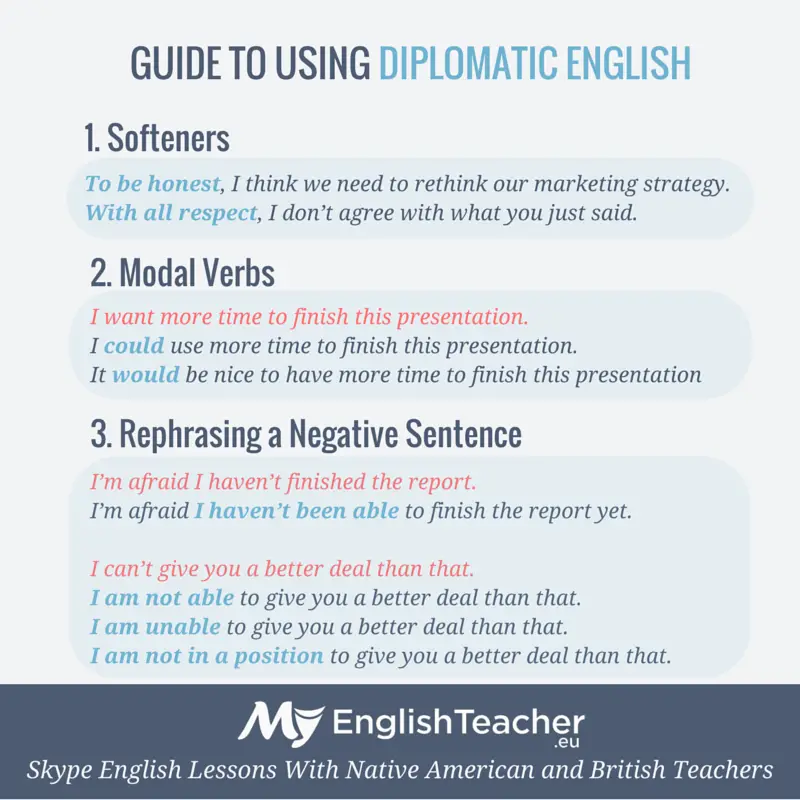
If you’ve ever found yourself in a situation where you have to tell your boss or a client some bad news, then you’ll know just how important it is to be able to use diplomatic English.
Choosing the right words and the right grammar can go a long way to removing some of the unpleasantness of the message we have to deliver. It can also help us to maintain a level of deference that we wish to show to superiors or clients in the normal course of business.
Using language diplomatically can be a challenge, even when speaking our mother tongue, but it is especially difficult when speaking a foreign language since we often lack the appropriate vocabulary, and a knowledge of alternative grammatical structures.
Consider the following sentence:
- I haven’t finished the report.
The speaker has done nothing here to soften the negative content of the message. A more diplomatic version might look something like this:
- I’m afraid I haven’t finished the report.
1. Softeners
‘I’m afraid’ is commonly referred to as a ‘softener’, a linguistic tool used to soften the tone of our content or convey politeness when we speak. Softeners often occur at the beginning of a sentence to prepare us for bad news: I’m afraid, so sorry, to be honest, unfortunately, with all respect
- To be honest, I think we need to rethink our marketing strategy.
- With all respect, I don’t agree with what you just said.
Read more:
Formal and Informal Email Phrases Starting with Greetings
2. Modal Verbs
Modal verbs such as would, could, may or might are great for softening a request or giving a command:
- I want more time to finish this presentation.
- I could use more time to finish this presentation.
- It would be nice to have more time to finish this presentation.
- Hand me the telephone, please.
- Would you hand me the telephone, please?
- Could you hand me the telephone, please?
3. Rephrasing a Negative Sentence
Negative sentences can be rephrased in order to make them appear more positive. Our very first sentence can be made even more diplomatic in this way:
- I’m afraid I haven’t finished the report.
- I’m afraid I haven’t been able to finish the report yet.
Using ‘be able to’ here places emphasis on your attempt to finish the report rather than your failure to do so. It implies that you are still working to complete the task and that your inability to do so is perhaps due to circumstances beyond your control (such as a heavy workload etc.).
The addition of ‘yet’ at the end of the sentence reinforces the idea that you are still working on the report and it is almost completed, thus helping to reduce the negative impact of the sentence’s underlying content.
Negative sentences that are formed with can’t and won’t make the speaker sound particularly negative and unhelpful and can often be rephrased with be able to, or a similar expression:
- I can’t give you a better deal than that.
- I am not able to give you a better deal than that.
- I am unable to give you a better deal than that.
- I am not in a position to give you a better deal than that.
Similarly, affirmative sentences containing words with a negative meaning can be rephrased in order to soften the message and achieve a more indirect effect:
- I am unhappy with this agreement.
- I am not entirely happy with this agreement.
- I am not totally happy with this agreement.
Here the negative adjective unhappy is replaced with its positive counterpart happy, modified with an adverb such as entirely, totally or completely, and the sentence is changed to the negative form.
Of course, to achieve the best results we’ll need to combine these techniques to make sentences that contain several of these elements:
- I’m afraid I haven’t been able to finish the report yet, so I’m not in a position to send it to you right now. Could you give me a little more time, please?
Hopefully, when you put some of these practical tips to use, you’ll find that being diplomatic and polite with colleagues or clients in English is not as difficult as it seems. To see more examples and the second part of this post go to
“Polite Expressions in English: Words, Phrases and Questions to be Kind”.
Read more:
Difference between POLITENESS and RESPECT


About author:
Jeremy Bentley is a professional native English teacher and a Greek to English translator. You can meet him and learn with him here at MyEnglishTeacher.eu.

























I am interested to improve my spoken English using polite words. Thank you.
Sir, I want to improve my spoken English with polite words.